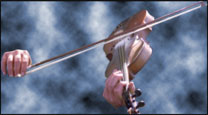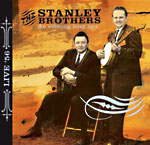
JigTime International

THE STANLEY BROTHERS – An evening long ago
Columbia/DMZ/Legacy
CK 86747
review by Joe Ross, Roseburg, Oregon - email
rossjoe@hotmail.com
 Stanley
Brothers fans will really rejoice at the release of “An Evening
Long Ago - Live 1956.” The session was recorded by Larry Ehrlich at the
WCYB radio studios in Bristol , Virginia on March 24, 1956 . It was originally
released as a private pressing for friends only and sold only at concerts.
Musicologists will recall that the inaugural broadcast from Bristol of
the Clinch Mountain Boys' “Farm and Fun Time” took place only about ten
years earlier, on December 26, 1946. The band made about $2.25 apiece
that evening, but the postcards, letters and invitations to play rolled
in. The station's listeners were ready for the Stanleys ' post-war mountain
music, and the musicians were ready to oblige, as well as to capitalize
on the exposure, publicity and income that the show brought them. They
left Bristol a few times for shows in North Carolina , West Virginia
, Louisiana , Kentucky , but they'd always return to Bristol . At the
time, their career in music had some ups and downs while they were traveling
the countryside in their Cadillac. The Brothers were successfully recording
for Rich-R-Tone and Columbia . In 1951, despite their success, Carter
and Ralph quit the music business and went to work at Ford Motor Co.
in Detroit . Soon after, Carter was back in music singing lead with Bill
Monroe's Blue Grass Boys. Ralph was in a serious auto accident in Tennessee
. Finances were tight. Ralph (and Pee Wee Lambert) built rooms in the
old Stanley country store and attended an agricultural instruction course
with plans to become farmers.
Stanley
Brothers fans will really rejoice at the release of “An Evening
Long Ago - Live 1956.” The session was recorded by Larry Ehrlich at the
WCYB radio studios in Bristol , Virginia on March 24, 1956 . It was originally
released as a private pressing for friends only and sold only at concerts.
Musicologists will recall that the inaugural broadcast from Bristol of
the Clinch Mountain Boys' “Farm and Fun Time” took place only about ten
years earlier, on December 26, 1946. The band made about $2.25 apiece
that evening, but the postcards, letters and invitations to play rolled
in. The station's listeners were ready for the Stanleys ' post-war mountain
music, and the musicians were ready to oblige, as well as to capitalize
on the exposure, publicity and income that the show brought them. They
left Bristol a few times for shows in North Carolina , West Virginia
, Louisiana , Kentucky , but they'd always return to Bristol . At the
time, their career in music had some ups and downs while they were traveling
the countryside in their Cadillac. The Brothers were successfully recording
for Rich-R-Tone and Columbia . In 1951, despite their success, Carter
and Ralph quit the music business and went to work at Ford Motor Co.
in Detroit . Soon after, Carter was back in music singing lead with Bill
Monroe's Blue Grass Boys. Ralph was in a serious auto accident in Tennessee
. Finances were tight. Ralph (and Pee Wee Lambert) built rooms in the
old Stanley country store and attended an agricultural instruction course
with plans to become farmers.
These are the kinds of things that the Stanley Brothers were facing in life when they accompanied Curley Lambert (mandolin), Ralph Mayo (fiddle) and Larry Ehrlich (recording engineer) to the radio studio around midnight to record live around one microphone. Around that time, they were using either Bill Lowe or Doug Morris on bass, but the session unfortunately took place without a bass-player. The set starts with Larry saying, “Let ‘er roll.” As with many live recordings, you get spontaneity, energy, and even a few comments or ambient noises. You can hear a door closing on “Meet Me Tonight,” Carter's introduction to the 1928 murder tragedy near Danbury, N.C. for “The Story of the Lawson Family,” Ralph whoop it up a bit on “My Long Skinny Lanky Sarah Jane,” and a few throats clearing now and then.
It's interesting to note that, with a few exceptions, many of these songs are among the first recorded renditions of them for the Stanley Brothers. Little Birdie, Orange Blossom Special, and Tragic Love are some songs that had been recorded prior to March, 1956. For a few others, I am not sure if they were ever recorded by both Carter and Ralph (prior to Carter's untimely death in 1966) unless they appear on other live recordings from the era. A check of Gary Reid's preliminary discography of the Stanley Brothers doesn't indicate early versions of Dream of a Miner's Child, Poor Ellen Smith, Darling Do You Know Who Loves You?, My Long Skinny Lanky Sarah Jane, John Henry, and Feast Here Tonight.
The twenty tunes offered on this project include many of their famous brother duets and instrumentals, many from their own folkloric family tradition and early recordings of the 1930s and 40s. Carter plays a solid guitar and sings lead. Ralph plays banjo and sings tenor. “Shout Little Lulie” and “Little Birdie” were the first tunes that Ralph's mother, Lucy, had taught him on the banjo. Ralph used to play mandolin on “East Virginia Blues” on the Farm and Fun Time, and because this cut doesn't have banjo, I wonder if that is Ralph picking mandolin. Another curiosity is that Ralph Stanley uses the clawhammer style on “Bound to Ride,” a song he typically did during the 60s in standard three-finger style before rearranging it for clawhammer again about 1971. Also, the song credit for “Bound to Ride” should have properly been attributed to Arthur Smith. This album's 1956 recording of “John Henry” is done three-finger style, and that's another that Ralph rearranged for clawhammer style in 1973. Presumably, Carter learned “Train 45” from the records of Gilliam Grayson and Henry Whitter. Unlike Grayson's train that started from two different places on two different records ( Atlanta or New York ), Carter clearly says that his train leaves from Atlanta , Georgia , all aboard. Grayson and Whitter are also attributed as songwriters of this album's opener, “Handsome Molly.”
While many of these songs would be recorded again in later years on fancier equipment, “An Evening Long Ago” is a rawboned performance of their straight-ahead traditional old-time mountain music and bluegrass. This is a rare opportunity to experience the beauty and power of The Stanley Brothers at one peak in their music career together. It's simply the feeling on this disc that allows us to nostalgically relive a time when they traveled the circuitous, narrow mountain roads between radio stations, churches, barn dances, and tiny schoolhouse auditoriums.
For More Info on Joe Ross Visit
http://home.switchboard.com/joeross or
http://www.talentondisplay.com/joeross.html
 |